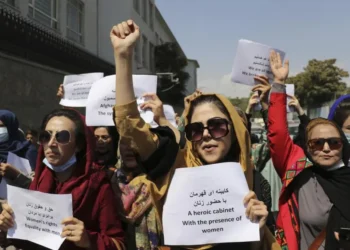Human Lives Human Rights: The US deployment of border agents on horseback against Haitian migrants on September 19, 2021, stems from abusive and racially discriminatory immigration policies by the administration of President Joe Biden, Human Rights Watch said today. The previous day, the Department of Homeland Security announced a six-step “strategy to address the increase of migrants in [the Texas border city of] Del Rio” that included a “surge” of agents to “improve control of the area” and new expulsion flights to Haiti.
The Haitians are being returned to Haiti under a US policy known as Title 42 , which singles out asylum seekers crossing into the United States at land borders – particularly from Central America, Africa, and Haiti who are disproportionately Black, Indigenous, and Latino – for expulsion. The expulsions are purportedly on public health grounds, but are discriminatory and abusive. By contrast, thousands of other travelers are able to enter the US.
“The US government showed a total disregard for the right to seek asylum when it sent agents on horseback with reins flailing to control and deter this largely Black migrant population,” said Alison Parker, US managing director at Human Rights Watch. “This violent treatment of Haitians at the border is just the latest example of racially discriminatory, abusive, and illegal US border policies that are returning people to harm and humanitarian disaster.”
The newly scheduled flights are the most recent in a series of expulsions the administration has carried out to Haiti, despite leaked documents showing that Homeland Security staff specifically warned that migrants and asylum seekers returned to Haiti “may face harm,” including violent crime, kidnapping, political crisis, and civil unrest. In August Human Rights Watch and 343 other civil society organizations, Haitian Bridge Alliance and Black Alliance for Just Immigration (BAJI), appealed to President Biden to halt deportations to Haiti, citing similar human rights concerns.
As recently as May, the US government recognized that political unrest and human rights abuses had made it impossible for Haitians to safely return to their country, which prompted DHS to designate Haitians in the US as of May for Temporary Protected Status (TPS). Under US law, that status does not apply to new arrivals.
Since the announcement of the six-step strategy, DHS has reportedly expelled Haitians from Del Rio on five to eight flights a day, and has interdicted people fleeing Haiti by sea. These procedures echo abusive policies in past years, when Haitian asylum seekers were interdicted and summarily returned, though eventually some were detained at the US naval base in Guantanamo Bay, Cuba or on ships and screened for asylum. The administration’s actions violate US and international law if it results in denying Haitians the right to challenge their removal to a country where they may face harm, Human Rights Watch said.
Human Rights Watch and other groups have urged the administration to end the Title 42 policy under which the expulsions are being carried out because it is illegal and grounded in a false public health rationale. In May, medical experts for Homeland Security filed a disclosure condemning the Title 42 policy, saying that it lacks a valid public health justification.
“The Biden administration’s continued use of Title 42 to justify sending people back to Haiti is out of step with public health best practice and international human rights law,” Parker said. “If Biden doesn’t shift course, he risks making hollow his promise of a ‘whole-of-government initiative to address racial equity and support underserved communities, and redress systemic racism in federal policies, laws, and programs.’”
The images and video from Del Rio of predominantly white federal agents on horses wielding long reins and chasing Black migrants recall the often unexamined and disturbing US history of racial and ethnic violence, including by border patrols, slave patrols, and vigilantes, Human Rights Watch said. Such legacies of discrimination have informed how many people in the United States perceive law enforcement actions today. In 2019, local law enforcement officials in Texas recognized the “negative perception” of their actions and apologized after an image circulated online showing white police officers leading an arrested, handcuffed Black man with a rope while mounted on their horses.
The White House press secretary, Jen Psaki, when questioned about the recent border images, said, “I can’t imagine what context would make that appropriate,” while declining to comment on the need for any accountability measures for excessive use of force.
Homeland Security Secretary Alejandro Mayorkas, who traveled to Del Rio, told the media that “to ensure control of the horse, long reins are used, but we are going to investigate the facts to ensure that the situation is, as we understand it to be. If it’s anything different, we will respond accordingly.” Subsequently, DHS announced a disciplinary investigation into the “extremely troubling” footage and stated that Mayorkas had ordered internal oversight of the agents’ conduct at the Del Rio migrant camp.
The Biden administration should actively confront and address the history of systemic racism in US immigration enforcement, and urgently overhaul racially discriminatory policies like Title 42, Human Rights Watch said.
“The use of Title 42 follows a long, tragic, and sordid history of the US government interdicting and summarily returning Haitian migrants and asylum seekers,” Parker said. “Instead of continuing harsh, racially discriminatory, and illegal policies directed against a group of people who are overwhelmingly Black, the Biden administration should unequivocally break with this history and ensure equal treatment for all.”


















